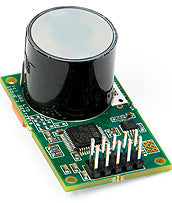Helping students learn about science through the use of our products is one of the privileges we have here at CO2Meter, so we were excited to learn that one of our COZIR wide-range CO2 sensors is slated to be used in a student experiment to go the International Space Station in March, 2016.
The experiment is part of the International Space Station (ISS) Project, a joint program between NASA and students. This experiment was designed by students from the Valley Christian High School in San Jose, CA.
The ISS Project's educational program provides students with the opportunity to conceive, design, build, test, integrate, and qualify computer-controlled science experiments that are then sent into space. Each experiment’s module data is downloaded to an ISS astronaut’s laptop and sent to Earth for evaluation by the students.
James Nadir, a Silicon Valley engineer who retired from Intel, mentors students in the Valley Christian High School ISS program. He reached out to CO2Meter for technical details. James wrote,
“The experiment measures the CO2 produced through the fermentation of Kampuchea Tea. The objective is to measure the relative amount of CO2 rather than the absolute (the station has a high CO2 content). The computer is made by Parallax and is called the Stamp. It is actually a system on a chip which integrates a PIC processor with PROM and RAM. The programming language is PBASIC. The Tokenizer occupies all of the on chip PROM, program and photo storage are in external components. The underlying flight program is a template driven custom BIOS system developed by school staff and myself. The resources available include I2C (SDA, SCL), 4 analog inputs (low input impedance 10bit ADC), and 8 digital IOs.”

Since 2011, The ISS Partner Program has successfully trained thousands of students from both public and private schools from the United States and abroad. Projects include 3D printing in space, crystallizing protein in micro-gravity, and many more.
The Valley Christian High School ISS program, which is open to any junior or senior high school, currently has schools from around the world participating to fly their experiments on the ISS. For more information about the program, you can contact Werner Vavken at wvavken@vcs.net.

